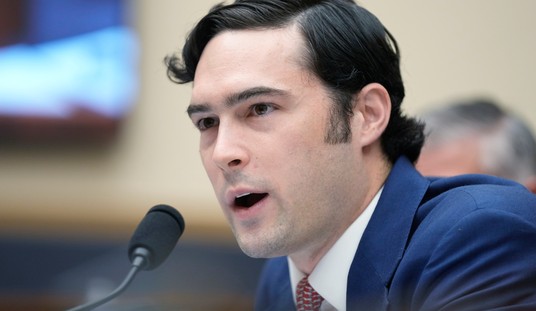President Obama should fire General Stanley McChrystal, the U.S. commander in Afghanistan, for a highly impolitic interview Gen. McChrystal gave to Rolling Stone magazine (of all places) mocking the Vice President and the U.S. Ambassador in Afghanistan, among others, and making evident his disdain for the Administration’s civilian management of the war effort. Obama should fire him – but he’s painted himself into a corner in which doing so would be damaging to him politically and to the nation’s war effort. Let’s review why.
When Barack Obama came into office, he had an Afghanistan problem. Obama had won crucial credibility with the anti-war Left, and thus the Democratic presidential nomination, by opposing (at times) the Iraq War. At the same time, he marketed himself as being serious about national security by touting his support for the war in Afghanistan. Coming into office, he needed to reassure the military, the Afghan government and other U.S. allies, and the existing domestic supporters of the Afghan war (many of whom were Republicans unenthused about supporting any Obama initiative) that he was really serious. Complicating matters, the Democrats had spent the prior several years building a narrative in which the Bush Administration had sinned by not listening to criticism from the brass, and in which military men like Gen. Eric Shinseki (now Secretary of Veterans Affairs) were all but sainted for publicly splitting with the Bush Administration’s war management. Obama, having little credibility of his own on national security matters, could scarcely hope to survive a public battle with his own military leadership.
Obama got off to a rough start. First of all, he came to office with no executive experience, no national security experience (in the Senate he’d never bothered holding hearings on the subcommittee he chaired overseeing Afghanistan) and no military service record; his Vice President, while schooled in foreign affairs, was likewise a career legislator with no military service record, ditto his Secretary of State. He ended up with yet another legislator running the CIA after his first choice was seen by the Left as too tied to the intelligence community. To balance this team out (Presidents always lack something and need balance from their advisers, but Obama lacked more than most), he had to lean heavily on holdovers: he kept Bush’s Defense Secretary, Robert Gates, and gave wide latitude to General David Petraeus, architect of the Iraq War surge that Obama, Biden and Clinton had opposed with varying levels of scorn. He also picked a military man (Gen. James Jones) as his National Security Advisor, although that has worked out poorly.
Then, as I detailed back in September, Obama backed off his original promises for more troops in Afghanistan and sacked the commander there, General David McKiernan, in May 2009 after McKiernan asked for more troops. McKiernan was replaced with General Stanley McChrystal, a blunt-spoken counterinsurgency specialist and ally of General Petraeus who had something of a track record – known to those around him – of speaking out of turn.
McChrystal quickly lived up to that reputation, with speeches and an assessment of the Afghan situation (leaked to the public) that increased the public heat on Obama to come up with more troops for the mission. McChrystal’s actions at the time tiptoed up to the line of undermining the all-important chain of command, but they were also critical to moving the public and the President in support of the war effort. The President eventually gave in, delivering a substantial troop surge, albeit one with a good deal fewer forces than McKiernan or McChrystal had asked for and with a bunch of promises to his own supporters about withdrawal timetables.
Now, months later, McChrystal has plowed over that line, and done so for no such obviously good purposes, and with plenty of notice about what the article would look like. Military men in a theater of war are prone to strong opinions, and it’s hard to say that Vice President Biden and Ambassador Karl Eikenberry, among others, haven’t earned Gen. McChrystal’s contempt. But doing so in public is insubordination, plain and simple, and completely inconsistent with our tradition of a chain of command and civilian control of the military. A military man who wants to open both barrels in public against the political leadership has a time-honored way to do that: resign his commission and enter politics. As Harry Truman understood when he fired Douglas MacArthur – then a national hero – at great political cost, a president who doesn’t show the generals who is boss is no longer running anything. That’s bad for civilian-military relations and bad for the president’s and the nation’s credibility, as subordinates learn they can get away with more and allies and enemies wonder who they should listen to. While it speaks well of Gen. McChrystal that the Afghan government is publicly backing him, a president who lets foreign governments, even key allies, have any say in picking his own military officers has lost face he can’t recover.
So, to preserve his own credibility and authority and secure the chain of command, Obama must fire General McChrystal. But doing so isn’t so easy. As Dan Foster notes, the conclusion of the prior dust-up over troop strength showed that much of the public’s trust in Obama was based on the credibility of McChrystal’s recommendations. The champions of Gen. Shinseki will look – rightly – like contemptible hypocrites for sacking a distinguished commander for saying what he thinks. The troops in the field, always prone to regard civilian meddling as foolhardy, may regard the firing of a blunt commander – barely a year after the last commander was sacked after disagreeing with the White House – as a sign that the civilian leadership can’t take some hurt feelings. Obama is also simultaneously cruising for a divisive showdown over ending Don’t Ask, Don’t Tell, a change that is sure to be opposed in at least some corners of the military. More significantly, in the short run, McChrystal’s experience and expertise may be hard to replace overnight.
And worst of all for Obama, a credible declare-victory-and-begin-to-draw-down scenario, as was attained by the success of the surge in Iraq by mid-2008, is not on the horizon:
Underlying everything is a far bigger problem. Obama’s strategy of shifting the military’s focus – and 30,000 troops – from Iraq to Afghanistan hasn’t yet yielded a major breakthrough.
The disaster in the Gulf has obscured a steadily increasing drumbeat of bad news and ill omens on Afghanistan. After mixed results in the campaign to re-take Marja, the Pentagon was forced to delay a critical summer offensive in Kandahar, the cradle of the Afghan Taliban insurgency. Earlier this year simmering tensions between the administration and Afghan President Hamid Karzai broke into the open with U.S. officials sharply criticizing Karzai on issues ranging from corruption and nepotism to the fitness of the country’s fighting forces to electoral reform – set against the backdrop of a resurgent Taliban.
That lack of tangible success seems to be splitting official Washington, slowly but inexorably, into hawks and doves camps, with Gates bearing the flag for those who favor a relatively open-ended large-scale commitment of troops with Vice President Joe Biden and others pushing for a far more scaled down approach and Obama himself somewhere in the middle.
People close to Obama say the president recognizes the crisis isn’t just about any one general, but recalibrating policy after a delay of the summer offensive in Kandahar and harmonizing a fractious team of military and civilian advisers.
Whether Obama chooses to start abandoning the war effort or again to face down calls from his own base to do so, he will need the credible backing of trusted military leaders – and shoving out the architect of the current plan (who may well respond by issuing blunter critiques from the outside if he’s pushed out) and bringing in a third commander in Afghanistan in 14 months is no way to win confidence from the public, the military or our allies.
These are tough decisions, and precisely why the presidency is not suited for on-the-job training for people who have never run anything before, or for politicians like President Obama who have built up no basis for trusting them on critical issues of national security. Obama has been walking a very narrow tightrope on Afghanistan, supported largely by the generals. He may be about to fall off.














Join the conversation as a VIP Member